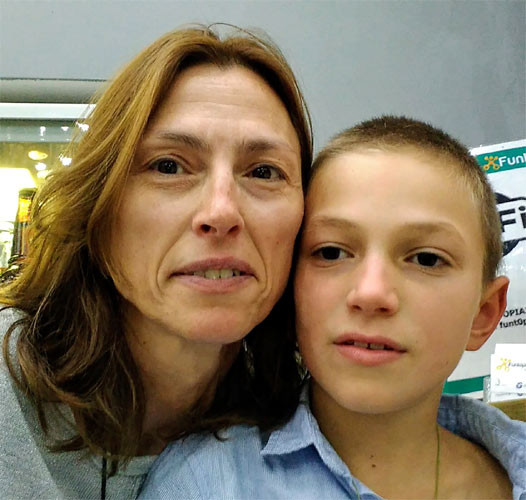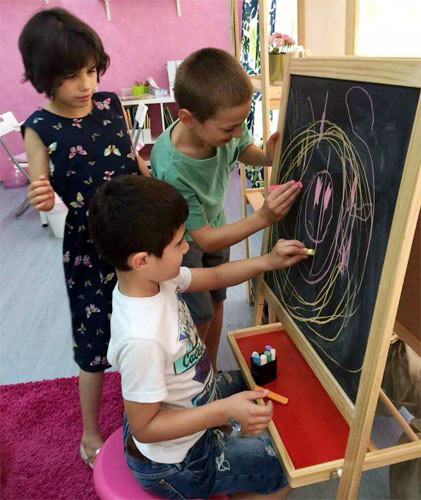A progressive school for children with autism would open doors in Sofia. "It is important to have a comprehensive approach when working with children with autism," Hristina Babalova, Chair of the “Education Equality-Autism” Association, says.
The number of children diagnosed with autism has been constantly growing. There are no accurate statistics in Bulgaria, but according to the World Health Organization 1 out of 160 children has autism spectrum disorder *. These children need teachers and environment helping them overcome deficits and realize their potential.
 “Pupils with autism now have two options: the child could study in an ordinary class, as it is most often recommended that the parent becomes an assistant as the teachers cannot fully meet the needs of this child. The other form of education is individual but in this case the child has no contact with classmates. Integration is very important for these children,” Christina Babalova, mother of a child with autism and head of the Education Equality Association says.
“Pupils with autism now have two options: the child could study in an ordinary class, as it is most often recommended that the parent becomes an assistant as the teachers cannot fully meet the needs of this child. The other form of education is individual but in this case the child has no contact with classmates. Integration is very important for these children,” Christina Babalova, mother of a child with autism and head of the Education Equality Association says.
Parents, teachers and pupils face various problems as one of the biggest issues is lack of training for working with children with autism among a large part of pedagogical staff. Hristina Babalova told us more:
"In a class of 20 children, if there was a child with autism, the teacher simply cannot use time effectively. If the child felt discomfort the assistant takes him or her out, so that the class is not interrupted. There is insufficient work with specialists provided - a speech therapist is provided for half an hour a week to a child with non-verbal autism, i.e. a child who does not speak."
Complementary specialists also work with children with special needs, as the number of specialists can reach 6-7 people, which is also stressful for the child. “The number of specialists working with my child is at least 25 people as one is not acquainted with the work of the other,” Hristina Babalova says.
 It is important to have a comprehensive approach to work with children with autism. Creating a new school where all the specialized activities would be carried out in one place is necessary. Besides the link between specialists, another serious problem would be solved – extensive commuting. Currently, children with special needs spend many hours traveling from one place to another, instead of resting, being engaged in sports or talking to peers. Therefore, parents hope a specialized group for children with autism will be opened in a new school:
It is important to have a comprehensive approach to work with children with autism. Creating a new school where all the specialized activities would be carried out in one place is necessary. Besides the link between specialists, another serious problem would be solved – extensive commuting. Currently, children with special needs spend many hours traveling from one place to another, instead of resting, being engaged in sports or talking to peers. Therefore, parents hope a specialized group for children with autism will be opened in a new school:
“This is a joint project with Progressive Primary School,” says the head of Association “Education Equality – Autism”. “They gave us a helping hand, especially in bringing the issue of education of children with autism to the social agenda. We now have to train specialists who are ready and willing to work with children with autism using new and proven methods.”
It is envisaged that an innovative methodology will be used and over the years it will be adjusted in order to fully meet the needs of Bulgarian children.
In addition to education, the program also focuses on behavior. In order to provide complex care and comprehensive work with children, school classes are planned to take place in the morning, while in the afternoon children would be engaged in sporting activities, art and music therapy.
“We hope more people would recognize this issue and start building a community of associations like ours. We want to help institutions in staff training, so there are more experts, specialized in working with children with autism.”
English: Alexander Markov
Photos: private libraryThe 14th edition of DiVino.Taste, Bulgaria’s leading forum for wines and winemakers, will take place from 28 to 30 November at the Inter Expo Centre in Sofia. Over 80 producers from all wine regions will participate, offering tastings of around 600 of the..
Minutes before the second and final reading, at the parliamentary budget and finance committee, of the state budget for 2026, the leader of the biggest party represented in parliament GERB Boyko Borissov halted the procedure and sent the draft bill..
Despite being in Bulgaria’s poorest region, the North-West, Vratsa Province ranks among the top three in the country for economic development. According to 2023 data from the National Statistical Institute (NSI), it shares third place with Varna on the..
Minutes before the second and final reading, at the parliamentary budget and finance committee, of the state budget for 2026, the leader of the biggest..
The 14th edition of DiVino.Taste, Bulgaria’s leading forum for wines and winemakers, will take place from 28 to 30 November at the Inter Expo Centre in..

+359 2 9336 661
